So much happens during Holy Week that there’s not time to take it all in. Let’s look at some things that can be missed.
1. We are encompassed by the Resurrection
Tomorrow we celebrate Lazarus Saturday. Actually, 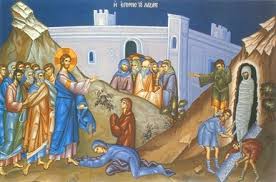 the raising of Lazarus took place some time earlier, and John’s Gospel says it was then that the Jerusalem authorities began to plot against Jesus. But he was not ready to get “caught”. The Lord was timing his death for Passover, Pascha. He would be the new Paschal lamb who would take away the sins of the world and lead his people towards a new Promised Land. Bethany was only 2 miles east of Jerusalem, too close. So John says that after raising Lazarus Jesus went down to a town called Ephraim and stayed in hiding for a while.
the raising of Lazarus took place some time earlier, and John’s Gospel says it was then that the Jerusalem authorities began to plot against Jesus. But he was not ready to get “caught”. The Lord was timing his death for Passover, Pascha. He would be the new Paschal lamb who would take away the sins of the world and lead his people towards a new Promised Land. Bethany was only 2 miles east of Jerusalem, too close. So John says that after raising Lazarus Jesus went down to a town called Ephraim and stayed in hiding for a while.
So why did the Fathers place Lazarus Saturday on the day before Palm Sunday? In order to surround Holy Week with resurrection. At the beginning Christ’s words, “I am the Resurrection and the Life” and the raising of Lazarus, and at the end the glorious Resurrection of Christ. We live the darkness of Holy Week encompassed by the light of resurrection.
The Church ever since has surrounded each week with Christ’s Resurrection, as Sunday by Sunday we sing of it in an 8-tone cycle. Here are Tones 1 and 2. For reasons I don’t understand this may take a little while to load, and you may have to tap the arrow at the bottom left.
For those who don’t know, that was Byzantine chant. The following is Russian. Keep listening, and you”ll hear all the rest of the 8 tones.
If you want to hear literally dozens of Resurrection hymns, come to Saturday Vespers and Sunday Orthros.
And so the pattern is established. We see that our lives, even our darkest days, are encompassed by Christ’s Resurrection 2000 years ago and Sunday by Sunday today in the Church, and by our resurrection which is to come. The Orthodox Church is the Church of the Resurrection.
2. How to receive gifts gracefully
But now, as John (12:1) tells us, “6 days before Passover Jesus came to Bethany where Lazarus lived whom he had raised from the dead.” The time had come.
Martha, Mary and Lazarus hosted a supper for 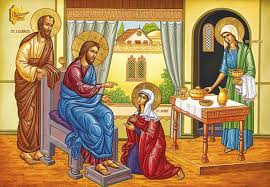 him. Mary took a pound of nard, fragrant oil imported from the Himalayas – worth 300 denarii, about $1000 in today’s terms – and anointed Jesus’ feet and wiped them with her hair. Decent women did not do that. It was extravagant devotion. Judas Iscariot asked “Why was this oil not sold and, given to the poor?” Jesus answered, “Leave her alone. She is doing this to prepare for my burial… The poor you have with you always, but you do not always have me.” You can imagine the dreadful hush that fell over the table. Indeed, a week later Mary will be going to his tomb to anoint his Body.
him. Mary took a pound of nard, fragrant oil imported from the Himalayas – worth 300 denarii, about $1000 in today’s terms – and anointed Jesus’ feet and wiped them with her hair. Decent women did not do that. It was extravagant devotion. Judas Iscariot asked “Why was this oil not sold and, given to the poor?” Jesus answered, “Leave her alone. She is doing this to prepare for my burial… The poor you have with you always, but you do not always have me.” You can imagine the dreadful hush that fell over the table. Indeed, a week later Mary will be going to his tomb to anoint his Body.
Jesus accepted the extravagant gift. By this he taught us that gifts given out of love, no matter how great, should never be rejected. Christ also commanded us to give to the poor. So accept the gift and then give something equally extravagant to the needy. God gives to us so generously. Continually give his gifts away, so he can give them back to us again even more generously, as Christ did. He accepted Mary’s great gift, then gave her and gave us all the greatest gift: his death and resurrection, eternal life. We make this interchange at every Divine Liturgy. Under the forms of bread and wine – in fact, we Orthodox call them the “Holy Gifts” – we offer ourselves to God. In return Christ gives us infinitely more: our gifts to him transfigured into his Body given for us, his Blood shed for us. This, in all we do, is the Christian way of life.
3. The danger of zealotry
John says many came out to Bethany to see Jesus and Lazarus. Talk was spreading: Could this be the Christ? The Jerusalem authorities figured that raising someone from the dead could be faked, and they were sure Jesus was a fraud. It never entered their minds that he might really be the Messiah. Did they listen to him? No. Did they talk to him? No. But what if he is worse than a charlatan? What if he actually thinks he is the Messiah? People expect the Messiah to drive out the Roman occupiers. So what if this man starts an uprising, and the people follow, and the Romans respond? We’ll be wiped out. (This was a valid concern. 40 years later there was a rebellion, and that was the end of the Jewish nation.) The authorities had discredited fake Messiahs before. With Jesus it hadn’t worked, and now here he is at the gates. This is getting out of hand. So they began to consider killing him. As the high priest said “Better one man should die than that the nation be lost.”
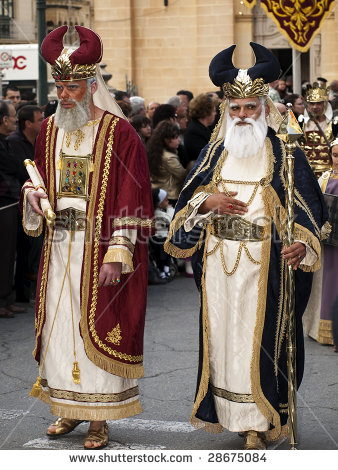
Don’t make the scribes, pharisees and priests into simply evil men. Mark (15:10) wrote that “it was out of envy that they handed Jesus over” – this young north-country upstart who so easily made them look like fools But above all they were single-mindedly zealous for their nation. That was the one thing that mattered. They were blind to anything else. In their zealotry for their nation, they would not see the One who was “in their midst”. And so they would violate their own law: “Have nothing to do with a false charge and do not put an innocent or honest person to death, for I will not acquit the guilty.” (Exodus 23:7) They killed this innocent sinless God made Man, their Messiah, lest the nation be lost. And so in the end it was not because of him but because of them and their blind zealotry for their nation, that the nation they loved was lost.
4. The great danger of religion
Note carefully: It was the religious leaders, not the politicians, who plotted Jesus’ death. Pontius Pilate the governor didn’t want to do it. “Why, what evil has he done?” he would ask on Holy Friday. But the Jewish leaders pushed, manipulated Pilate into executing him.
Dr. Samuel Johnson said, “Patriotism is the last refuge of scoundrels.” No. patriotism is next to last. Religion is the last refuge of scoundrels. True religion is, of course, the source of enormous good: hope and holiness, meaning for life and great charitable work. But we have seen for centuries, we see today what horrible things can be done in the name of religion.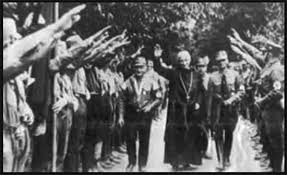 Because religion, the quest for the Ultimate, is the highest of all things on earth, it can do the greatest good. But when it goes bad it becomes demonic and can do the greatest evil.
Because religion, the quest for the Ultimate, is the highest of all things on earth, it can do the greatest good. But when it goes bad it becomes demonic and can do the greatest evil.
Religious leaders of many kinds have done great evil or ignored great evil – for the sake of what? the nation? the religious institution? its position? its power? their own position? their power? Like the Jewish authorities, it’s not that they intend to do evil. The problem is that religious leaders are often so sure, so sincerely certain they are right, that their will is God’s will, their ideas are the truth, that they can be blind to anything else. You see what it can lead to, both 2000 years ago and today, if religious leaders have lost their way.
One of my favorite pieces of advice is that 1960s slogan: Question authority. Not with blind doubt, of course. Authorities are often right. But if the Jews 2000 years ago had questioned what their authorities said about Jesus… what might the world be like today if they had believed in him? Question political authorities, of course, but also question religious authorities. Not only the rich preachers on TV, not only the priests who use their position to steal or do horrible things to youth and their duplicitous superiors who cover up for them. Also question your own Priest and your Bishop and your Archbishop. Gently, gently, please, not in a nasty way. You might be wrong. But clergy also can be wrong, and humility requires that they accept questioning. Also, definitely question the author of this Blog and what I write. I might be wrong.
Orthodox Christians, this is your obligation, for we are not an authoritarian “top-down” Church. All Orthodox people are guardians of the Faith and of the Church. So if you ever think any of us in positions of leadership in the Church are out of line, misusing our authority, do not let us get away with it.
5. The greater danger of religion with political power
Now, of course religion should influence politics. This can lead to great social good: Byzantium the greatest of empires, the abolition of slavery, Martin Luther King and racial justice, and much more. But if religious authority and political power become enmeshed, be afraid, be very afraid. Religion combined with politics can lead to Christian emperors destroying icons, to the Crusades, to the Inquisition, to the 100 Years War, to Isis, to what has been done to Jews and Palestinians and Syrians and Iraqis – and to the killing of God.
I think Byzantium had the ideal, in principle if not always in reality: civil authority and religious authority working in synthesis with each other, or sometimes playing against each other if necessary, but not confusing each others’ roles. Did you know: because religion with political power is so dangerous, the Orthodox Church does not allow clergy to hold political office. For our chief work is not to compel but to convince, convert, win people  to Christ and his way of love.
to Christ and his way of love.
That is how our Lord Jesus did it: Do we see him this Week leading an army? taking over the government? On Friday morning Pontius Pilate will say to him: “So you are a King then?” Jesus will answer, “You have said it… but my Kingdom is not of this world.” The Jewish authorities therefore decided the only way to get rid of him was to lie about him: “If you let this Man go, you are not Caesar’s friend. Whoever makes himself a king speaks against Caesar.” And when Pilate asked, “Shall I crucify your king?”, they concluded their only choice was to blaspheme their God: “We have no king but Caesar.” All in the name of the “greater good”, their zealotry to save the nation. Lord, have mercy. So by abandoning their morals, they succeeded in executing Christ – and their nation was lost. Can you think of any contemporary examples of religious leaders selling out their moral principles for political gain?
It was written that many of the people hoped in Jesus. See them as he enters the city. But in the end they trusted their authorities, as most people do. (I think our present distrust of government in America is an historical aberration, albeit justified.) And so as Jesus had predicted, “the Kingdom will taken away from you and given to a nation that will bear the fruits of it”, the Church. Years later Saint Paul would write: If God did not spare the original tree, the Jews, when they were unfaithful, what do you think will happen to you who have been grafted on? To us if we are blind? unfaithful? if we misuse the Church and twist our holy religion to our own ends?
6. The source of true power
On Sunday morning a multitude prepared to welcome Jesus as he came into the city. This was something more than the customary welcome for dignitaries. The people cried out quoting a Messianic Psalm: “Hosanna! Blessed is he who comes in the name of the Lord.” Luke says the Pharisees complained: Listen to what they’re saying about you. Stop them. Jesus answered, “If these were silent the very stones would cry out.”
 So the Messiah came riding not in a chariot as a worldly conquerer, but on a donkey. Who rode on donkeys? the underclass, servants, nobodies. John wrote that only later did the Apostles understand. He was acting out a verse from the prophet Zechariah: “Fear not, Jerusalem. Your king comes to you humbly, riding on the colt of a donkey.” The Lord of all came not to lord it over us. He came in humility to die for us.
So the Messiah came riding not in a chariot as a worldly conquerer, but on a donkey. Who rode on donkeys? the underclass, servants, nobodies. John wrote that only later did the Apostles understand. He was acting out a verse from the prophet Zechariah: “Fear not, Jerusalem. Your king comes to you humbly, riding on the colt of a donkey.” The Lord of all came not to lord it over us. He came in humility to die for us.
Jesus then went not to the governor’s headquarters to battle the “politicians” as everybody expected, but rather to the temple, to the religious leaders where the real problem lay. When he saw the money changers cheating people, he drove them out saying, “You have turned my temple into a den of thieves.” “My temple.” His temple? The authorities were aghast: He’s crazy. He thinks he’s God! They were also pleased, because now they had the right charge to lay against him at his trial in the Sanhedrin: “He made himself equal with God”.
However, the Pharisees were also in a panic. The high priest said, “We’re accomplishing nothing. Look, the whole world has gone after him.” They must now move quickly before it’s too late. John says his words were a prophecy. Because they would arrange the death of Jesus, he would now conquer death, “trampling down death by death”. And that is why he had come. For there is something worse than losing your nation or anything else on earth, and that is losing eternity.
I’m no expert on international politics but… Our very Orthodox Vladimir Putin is beginning Holy Week by threatening the world with an ICBM named “Satan 2”. I’m wondering if maybe he should begin Holy Week by taking a closer look at Jesus.
Indeed the world would “go after” Jesus. How could anyone that day have imagined it? This powerless Man hanging on a Cross… Within 3 centuries the whole Empire would “go after him”, and the Emperor Constantine the Great would be baptized into the Death and Resurrection of Jesus Christ. Today 2000 years later more than a billion Christians on earth are “going after him”, following Jesus of Nazareth through life, into death and out the other side with him into the Resurrection.
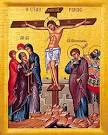
Paul would later write, “The message of the Cross is foolishness to those who are perishing, but to us who are being saved it is the power of God… We preach Christ crucified, to the Jews a stumbling block and to the Greeks foolishness, but to those who are called… Christ the power of God, and the wisdom of God. Because the foolishness of God is wiser than men, and the weakness of God is stronger than men.” (I Corinthians 1)
Dear brothers and sisters, during this blessed, life-giving Holy Week, do not read this Blog. Instead go to church as much as you can. When you can’t, follow the Church’s daily Lectionary. * Walk again with our Lord Jesus and his Apostles and his Church through the darkness and confusion and horror, towards the glorious and amazing Conclusion.
- The Greek Archdiocese sites are the easiest to access. See https://www.goarch.org/chapel/. On your smartphone download the Daily Readings app from the Greek Archdiocese.
Next Week: But if you really must read this Blog during Holy Week, a short Holy Friday post – How Orthodox Understand the Cross of Christ
